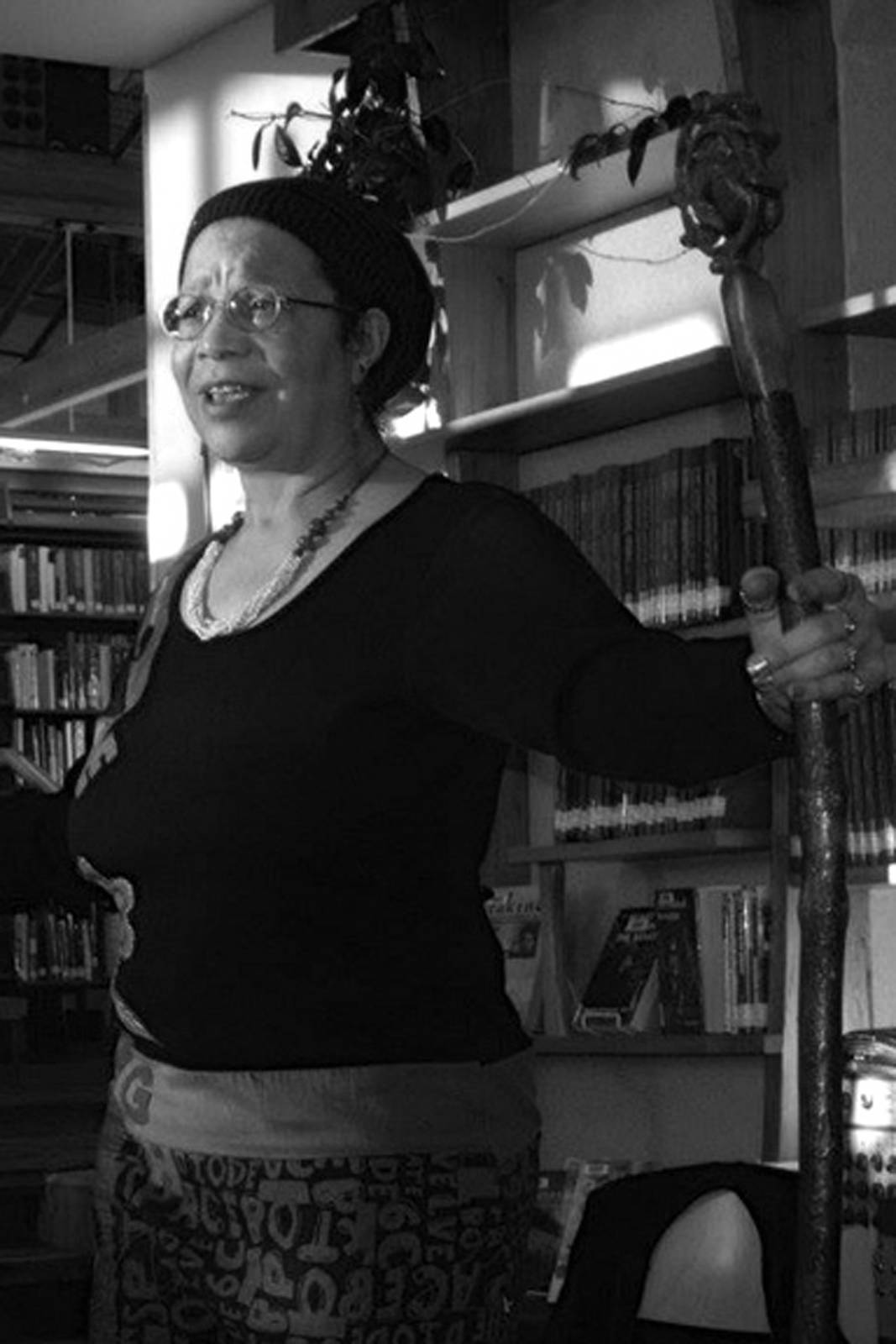By Lori Evans
Homer News
Skywalker Payne holds her spider staff as she walks back and forth in front of the group that’s gathered at the Homer Public Library in late November to hear stories as part of Tellabration, an international event designed to celebrate storytelling.
With a confident cadence, she shares first a story she wrote when she was 11 about a boy and girl who go swimming and find themselves in a wondrous other world at the bottom of the ocean, then she weaves an African folk tale of a parent who goes in search of stories for the children, pausing her story-telling pace long enough to make eye contact with audience members.
She uses the staff for effect. It was a gift from a neighbor who was a wood carver. The spider is her totem “because spiders mean good luck and spider woman weaves stories in many traditional Native American cultures,” she explains later.
Before those in the audience are invited to share their own stories — which they do with minimal arm-twisting — Payne tells what is, perhaps, her favorite story: “Three Wondrous Answers.”
A version of the story is found in several cultures, and Payne has modernized it a bit. The story centers on a country’s leader going in search of answers for three tough questions: What is the most important thing to do at all times? When is the best time to do a thing? Who are the most important people to work with?
We won’t spoil the story by giving the “three wondrous answers,” but Payne says the story is particularly meaningful to her “because it’s about the importance of living in the moment because now is all we really ever have.”
At the Tellabration event, Payne is joined by fellow storyteller Carol Ford who dons a pith helmet — originally her father’s mail carrier hat that’s similar to those worn on safaris — and entertains the audience with her rendition of the Dr. Seuss classic “Horton Hears a Who!”
It’s the first story she ever memorized and she’s been performing it as if she were a one-woman show since she was 8.
“I have told it probably a thousand times, and I never tire of it,” she says later.
While she’s added lots of other tales to her repertoire, for Ford, “Horton,” embodies the essence of a good story.
“Obviously animals don’t talk. There wouldn’t be these same animals all on the same continent. … You can go through all the stuff that’s not real, yet I feel like it’s a very getting-at-the-heart-of-a-lot-different-things kind of story that is true. That’s the story to me: What’s the true thing you’re talking about?” she says in an interview earlier this month.
While Payne and Ford have decidedly different story-telling techniques — Payne’s is more traditional and conversational; Ford’s leans toward being performance based — the two women share a passion for storytelling itself.
And they’re inviting anyone who’s interested to join them to discover the joy of storytelling.
Homer Storytellers will hold their first gathering from 3-5 p.m. Saturday in the Homer Public Library conference room and continue to meet the third Saturday of every month at the library.
The gatherings are designed for participants to share stories and gain storytelling skills, say Payne and Ford.
Ford envisions the gatherings as “a place where people can go and become a community of oral sharers of memories and things that are dear to us … in ways that aren’t confrontational. Nothing has to be decided about these stories. You just share them and you have that in common. … Just think of the community bond that will form.”
There’s no agenda to the gatherings — except to tell stories, says Payne.
While everyone may love a good story, stories are far more than just words, say Ford and Payne, who get more than a bit philosophical when they talk about the importance of stories.
For Ford, it doesn’t matter what kind of story it is — a moment in your life that you retell, a tale passed down orally from ancient times, a literary piece that a storyteller recreates because the wording is so beautiful, or a theatrical show with a big cast —all stories are the way humans grapple with the question: What does it mean to be human? Indeed, stories are the only way humans have to deal with the question, she says.
Payne puts it like this: “It’s about even more than being human. It’s about the whole spirit. Story is what has created more than just our humanity. It’s created everything. Our whole being is story. Everything we deal with is a story. Our religions are stories. Our education is story. Everything is story.”
She doesn’t want to see face-to-face storytelling replaced by technology, and that’s one of the reasons she wants to see young people involved in traditional storytelling.
“It’s a real drag to go into a restaurant and see people on their phones. What’s the point?” she says.
The rewards of sharing stories go far beyond the story itself.
“Sharing these stories will strengthen each other, strengthen individuals and strengthen the community — and it will be fun. It’s the best way to build community, and it’s the traditional way of educating,” says Payne.


